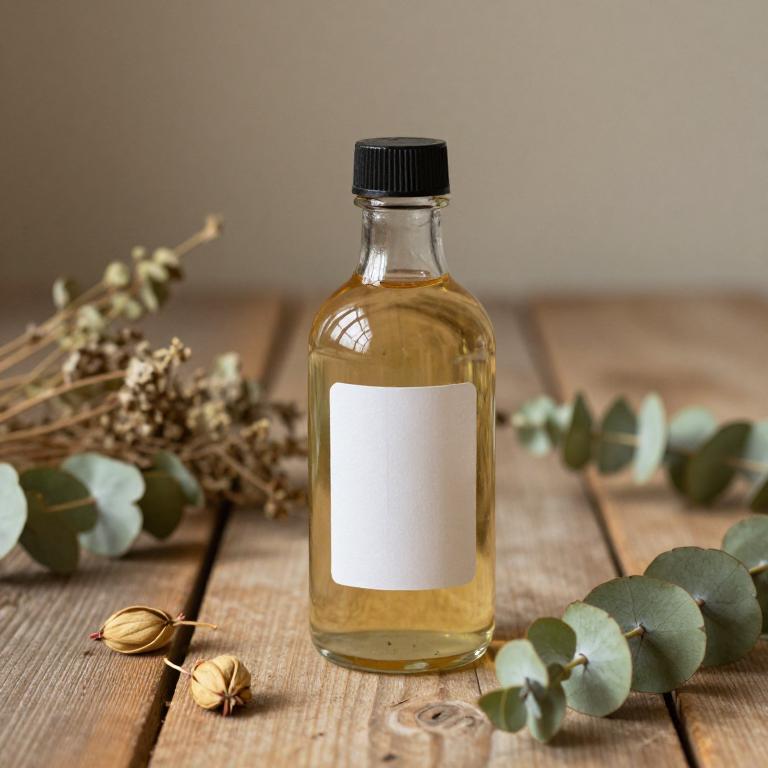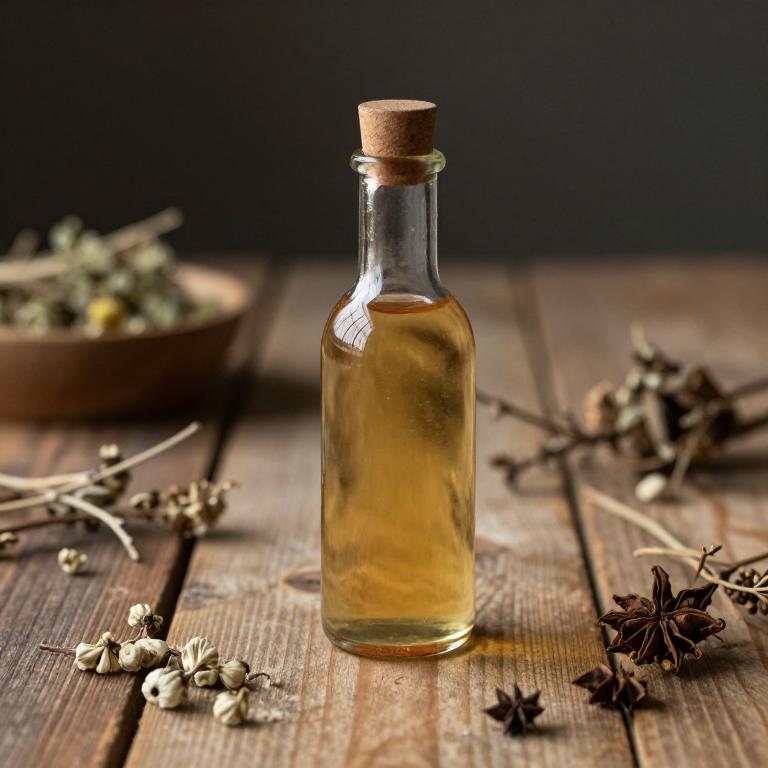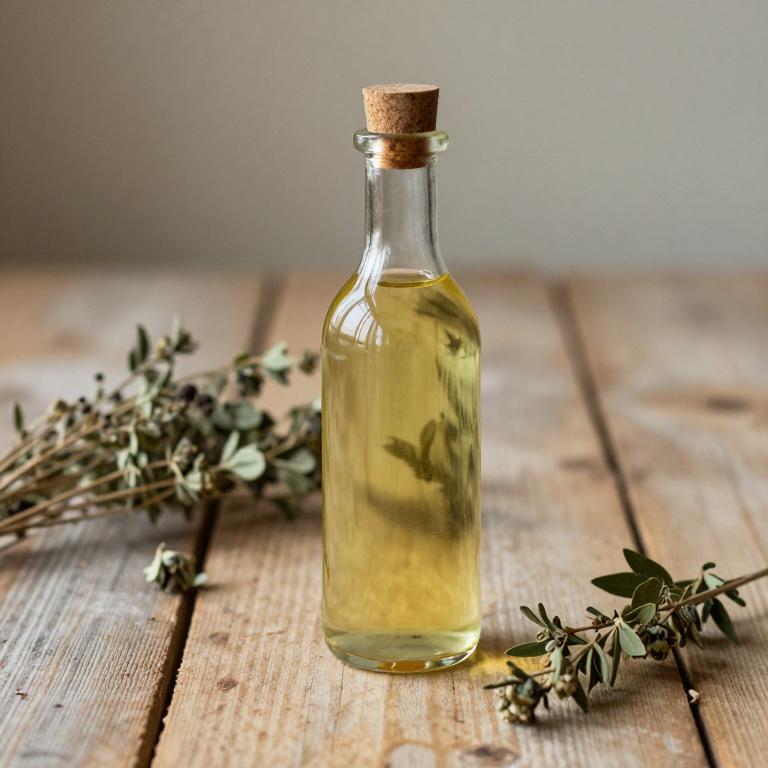10 Best Herbal Syrups For Toothache

Herbal syrups for toothache are natural remedies that combine soothing herbs with sweeteners to ease pain and reduce inflammation.
Common ingredients include clove, mint, eucalyptus, and licorice, which have antimicrobial and analgesic properties. These syrups are often used as an alternative to conventional painkillers, especially for those seeking gentler treatments. They can be applied directly to the affected area or swished in the mouth for maximum relief.
While they may provide temporary comfort, they should not replace professional dental care for persistent or severe tooth pain.
Table of Contents
- 1. Salvia (Salvia officinalis)
- 2. Yarrow (Achillea millefolium)
- 3. Fennel (Foeniculum vulgare)
- 4. Black pepper (Piper nigrum)
- 5. Ginger (Zingiber officinale)
- 6. Eucalyptus (Eucalyptus globulus)
- 7. Peppermint (Mentha piperita)
- 8. Rosemary (Rosmarinus officinalis)
- 9. Ceylon cinnamon (Cinnamomum zeylanicum)
- 10. Oregano (Origanum vulgare)
1. Salvia (Salvia officinalis)

Salvia officinalis, commonly known as sage, has been traditionally used for its medicinal properties, including its potential to alleviate toothache when formulated into herbal syrups.
These syrups often contain extracts of the leaves, which are rich in compounds like thujone and rosmarinic acid, known for their anti-inflammatory and antiseptic effects. When applied topically or ingested in small amounts, sage syrup may help reduce gum inflammation and soothe dental pain by inhibiting bacterial growth. However, it is important to consult a healthcare professional before using sage syrup for toothache, as it may interact with certain medications or have side effects in some individuals.
While not a substitute for professional dental care, sage herbal syrup can serve as a complementary remedy for minor tooth discomfort.
2. Yarrow (Achillea millefolium)

Achillea millefolium, commonly known as yarrow, has been traditionally used in herbal medicine for its anti-inflammatory and analgesic properties.
While it is not a primary remedy for toothache, some herbal syrups containing yarrow may be used as a complementary treatment to help reduce gum inflammation and soothe oral discomfort. These syrups typically combine yarrow with other herbs like echinacea or goldenseal, which are believed to support immune function and oral health. However, it is important to consult a healthcare professional before using any herbal remedy for toothache, as it may not address the underlying cause of the pain.
Despite its historical use, there is limited scientific evidence supporting the effectiveness of yarrow-based syrups for treating toothache specifically.
3. Fennel (Foeniculum vulgare)

Foeniculum vulgare, commonly known as fennel, has been traditionally used in herbal medicine for its soothing properties, and fennel-based herbal syrups are often recommended for缓解 toothache due to their anti-inflammatory and analgesic effects.
The active compounds in fennel, such as anethole and limonene, help reduce inflammation and numb the pain associated with dental issues. When prepared as a syrup, fennel can be easily consumed, making it a convenient remedy for temporary relief of toothache symptoms. However, it is important to note that while fennel syrup may offer some relief, it should not replace professional dental care for persistent or severe tooth pain.
Always consult a healthcare provider before using herbal remedies, especially if you have underlying health conditions or are taking other medications.
4. Black pepper (Piper nigrum)

Piper nigrum, commonly known as black pepper, has been traditionally used in herbal remedies for its potential anti-inflammatory and analgesic properties.
When prepared as a herbal syrup, black pepper may help alleviate toothache by reducing inflammation and soothing pain in the oral cavity. The active compound piperine in black pepper is believed to enhance the effectiveness of other pain-relieving agents, making it a valuable addition to natural remedies. However, it is important to consult a healthcare professional before using piper nigrum syrup, especially if the toothache is persistent or severe.
While some people may find relief from this traditional remedy, it should not replace professional dental care when necessary.
5. Ginger (Zingiber officinale)

Zingiber officinale, commonly known as ginger, has been traditionally used for its anti-inflammatory and analgesic properties, making it a popular ingredient in herbal syrups for alleviating toothache.
These syrups often combine fresh or dried ginger with honey, cloves, or other soothing herbs to create a natural remedy that can help reduce pain and inflammation in the mouth. The active compounds in ginger, such as gingerol and shogaol, are believed to work by inhibiting pain signals and reducing swelling around the affected tooth. While not a substitute for professional dental care, ginger-based syrups can provide temporary relief for mild toothaches caused by sensitivity or minor infections.
Regular use of such syrups may also support overall oral health by promoting saliva production and reducing bacterial growth.
6. Eucalyptus (Eucalyptus globulus)

Eucalyptus globulus, commonly known as eucalyptus, has been traditionally used for its soothing and anti-inflammatory properties, making it a popular ingredient in herbal syrups for relieving toothache.
These syrups often combine eucalyptus oil with other natural ingredients like peppermint, clove, and honey to enhance their analgesic and antiseptic effects. The menthol and eucalyptol compounds in eucalyptus globulus help to numb the gums and reduce pain by acting on the sensory nerves in the mouth. Additionally, the antimicrobial properties of eucalyptus can help combat oral infections that may contribute to toothache.
While not a substitute for professional dental care, these herbal syrups can offer temporary relief and support oral health when used as part of a holistic approach.
7. Peppermint (Mentha piperita)

Mentha piperita, commonly known as peppermint, has been traditionally used in herbal syrups to alleviate toothache due to its cooling and analgesic properties.
The menthol in peppermint oil acts as a natural pain reliever, helping to numb the gums and reduce the sensation of pain. These herbal syrups are often prepared by infusing fresh or dried peppermint leaves in a sugar syrup, making them easy to consume and effective for temporary relief. While they are not a substitute for professional dental care, they can provide soothing relief for mild toothaches and gum irritation.
Peppermint syrups are also appreciated for their refreshing taste and ability to stimulate saliva production, which can further aid in oral comfort.
8. Rosemary (Rosmarinus officinalis)

Rosmarinus officinalis, commonly known as rosemary, has been traditionally used for its aromatic and medicinal properties, including its potential to alleviate toothache when prepared as a herbal syrup.
The essential oils in rosemary, such as camphor and cineole, possess anti-inflammatory and analgesic qualities that may help reduce pain and swelling associated with dental discomfort. To make a rosemary syrup, fresh or dried rosemary leaves are often steeped in a sugar-water solution, allowing the beneficial compounds to infuse into the liquid. This syrup can be applied directly to the affected area or used as a mouth rinse to provide localized relief.
While it is not a substitute for professional dental care, rosemary syrup may offer a natural, soothing option for temporary relief from mild toothache symptoms.
9. Ceylon cinnamon (Cinnamomum zeylanicum)

Cinnamomum zeylanicum, commonly known as cinnamon, has been traditionally used in herbal remedies for its antimicrobial and anti-inflammatory properties.
When prepared as a herbal syrup, cinnamon can help alleviate toothache by reducing inflammation and inhibiting the growth of bacteria that cause dental infections. The essential oils in cinnamon, particularly cinnamaldehyde, contribute to its analgesic effects, providing natural relief from pain. To use it for toothache, a few drops of the syrup can be applied directly to the affected area or mixed with water for oral rinsing.
While cinnamon syrup is a natural remedy, it is advisable to consult a dentist for persistent or severe tooth pain to ensure proper treatment.
10. Oregano (Origanum vulgare)

Origanum vulgare, commonly known as oregano, has been traditionally used in herbal medicine for its potent anti-inflammatory and antimicrobial properties.
Herbal syrups made from oregano can be effective in alleviating toothache by reducing inflammation and combating bacterial infections in the mouth. The active compounds in oregano, such as carvacrol and thymol, help to soothe pain and promote healing of dental tissues. When used as a gargle or diluted in water, oregano syrup can provide natural relief for minor toothaches and gum irritation.
However, it is important to consult a healthcare professional before using herbal remedies, especially if the toothache persists or is accompanied by severe symptoms.